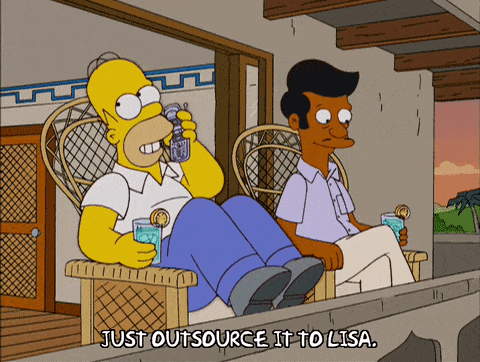Back in the days, when I had just started to work, I was sharing a condo in Rome, Italy with some friends. We all worked at that time, but we also enjoyed cooking and inviting neighbors over. Problem was, it was hard for the four of us to go to the grocery store, or supermarket, and prepare a nice dinner for everybody with short notice.

We needed more time, but adding hours to a given day doesn’t fall into our “mortal” domain as human beings. We needed to find a solution, a quick fix to that recurring scenario. And that’s why we agreed to rely on one another to buy desired ingredients or specific food. If I was stuck at the office, for example, I’d ask one of the other three to “merge” my list into theirs, so I could still help them cooking.
Without even noticing, we started to see and learn the huge benefits of delegating tasks to someone you trust.
Since dinners became more popular and frequent (who doesn’t like a homemade Italian dinner?!), we had to come up with a solution and take “delegating stuff” to the next level: we delegated the grocery shopping, just for our party dinners, to one of our neighbors.
Yes, we scaled thanks to outsourcing.
To be honest, it took a while before we all felt comfortable and “safe” doing that. Yes, outsourcing might look scary to first timers as we were. But after acknowledging this was just a temporary issue, all went through smoothly!
So why, in the first place, were we scared of delegating something we all cared about?
Meet the exotic sister of delegating: Outsourcing
At its core, outsourcing is an advanced form of delegating, i.e. assigning to someone else what you used to be in charge/responsible for. The act of delegating something usually entails somebody that is close to you, whether personally (friend, spouse, etc.), professionally (employee, assistant, etc.), or geographically (in our office, part of your team, etc.).
And when you delegate for the first time something business-related, widening up your reach to go beyond your “in-house” resources (aka you outsource it), that unpleasant feeling of mistrust starts to boil in.
When you ask other people to take care of something you usually are responsible for, it’s hard because you feel you’re losing control over it.
But that’s not the only thing you might be afraid of related to outsourcing.
What business owners fear the most when they think about outsourcing
Experienced business owners have all gone through at least one of the following feelings and thoughts when they started to outsource some of their client work to a third-party company. Specifically, they’ve all experienced variations of:

Sounds familiar? Well, I have now a good news and bad news for you: the good news is that all these fears can be grouped into one major set caused by one widespread psychological burden we all share. So it’s “just” one thing you’ll need to focus on, rather than 5. Good stuff!
Bad news is that psychological burden is hard to overcome because it’s what Carson Tate, founder of Working Simply, Inc. and author of “Work Simply: Embracing the Power of Your Personal Productivity Style” calls “the urge to do it all”.
Specifically, Carson says:
The most common obstacle to delegating is psychological–the insistence, either conscious or subconscious–on doing everything yourself. […] The insistence is really resistance.
I see what you’re thinking now. It’s your own business, the one you founded years ago, the one you stayed up at nights to get it started. It’s your “baby” ultimately, and that’s why more than often than not you find it hard to delegate matters that have to do with it.
So why the hell are there business owners outsourcing part of, or even completely, their client work? The answer is one: outsourcing is one of the most effective business strategies out there. That’s why top companies are outsourcing for growth.
Let’s dig deeper into what this means.
[bctt tweet=”When outsourcing, never take anything for granted. State all you need and leave loose specs out”]
Top ways outsourcing will benefit your business
An interesting IBM research found out that companies and organizations that implement smarter sourcing gain significant and measurable benefits in key areas: cost, quality, cycle time, predictability, and innovation.

Even if it’s not the most recent data, they still tell you something. Implementing a leaner approach to sourcing can bring huge benefits to your business. Let’s see some specific ones, then.
Quickly address client work requests
In a world that changes so fast (singularity is coming), having a good picture of your incoming workflow is a must, otherwise, you’d be completely burned down by the hills and valleys related to incoming client work.
And, as a business owner who has been running his/her company for a while, I do believe you’re good at planning your in-house resources for ongoing client work.
The problem here lies on how accurately you could plan your in-house workload based on future, not yet definite, incoming requests. As I’m pretty sure you can’t read the future, you won’t be able to plan your workload in advance. But you’re not lost!
That’s where outsourcing shows its compelling nature.
What if after you finish reading this article, you check an email from a client who kept you on hold for a bit? They finally said yes! Congrats, but what if you already have all your in-house resources stuffed with work? Could you afford to lose this client? Well, the answer is “of course not!”.
And that’s where outsourcing part of, or even the whole, client work comes in handy.
Work with highly-skilled specialists you don’t have in-house
Let’s keep the imagined scenario going on.
How about this client is willing to start working with your agency and needs something you, as a business, aren’t able to provide completely. For example, the client needs an eCommerce based on WooCommerce, but you already have your in-house Woo experts working on something else.
In that moment, you don’t have time to go through the whole hiring process to find a new developer specialized in WooCommerce. You don’t have that time, nor the willingness to go through that process for just a project.
What could you do, then? How could you find an experienced developer willing to kick off as soon as you’re both on the same page?
You outsource part of/the whole development to an experienced professional, one who has proven records with those types of projects you need now.
Cut costs
Hiring a Senior developer is key, but given his vast experience, is also expensive from a business perspective. Don’t get me wrong: it’s a fact that a Senior developer, or designer, marketer, etc. gets a higher wage than others in the same department. That’s fair.
But as a business owner, I bet you kinda always have to keep an eye on the monthly and yearly expenses on one side, while improving the quality of your services on the other. In an ideal scenario, you’d love to be able to hire more Seniors but it’s not always possible for budgeting reasons.
Same thing applies to other less experienced employees of all departments. Actually, the idea exceeds the limits of working roles and applies to department themselves like HR, accounting, etc.
By outsourcing part of your client work, you’d have way more chances to work with Senior developers, that you could ever hire in your entire life. Again, it’s not that it’s all about working with Senior devs. All is true to working with any professionals.
Outsourcing amplifies your reach for experienced professionals without directly increasing your expenditure
Scale your client work intake
Leveraging outsourcing correctly could enhance your business’ capacity to handle more incoming client work. Having a bunch of trusted outsourced developers at your disposal would allow you to say “yes” to more requests and projects, all without the need to have them on your payments book, not even in slow months.
With more projects your business can take care of, you’ll gain a higher number of those you’re delivering on a monthly basis. Therefore, an increased firepower related to your business.
But that’s just one way you could scale through outsourcing. If you succeed in finding trusted professionals to work with, you could start to think about providing a completely new service to your current clients or even reach new segments, thanks to that.
Think about offering speed optimization, maintenance, updates to custom themes, etc. as specific services your clients can now request from your agency, even on a recurring basis. You’ll be completely covered!
Or, as with the example above, you could even start offering eCommerce development customizations thanks to those outsourced developers you had already found.
Improve specific areas faster
One thing that many hardly see being generated by outsourcing part of their client work, or even whole departments, inevitably results in an increased focus on each project. As Michael F. Corbett in his “The Outsourcing Revolution” explains:
Businesses increasingly create teams to attack specific tasks and achieve specific results. A team comes together to find a solution and then disbands. Project leadership requires a different set of skills and a knack for blending team members’ competing interests. Everyone must stay focused on the task at hand.
Needless to say, with a greater focus potential, comes a different approach to project leading/management. But that’s not the topic of this article.
So, how could you start taking advantage of outsourcing as part of your business strategy?
How to merge outsourcing development or design work when you are an agency owner

The first thing you might be thinking now would be to go out and look for a WordPress developer or designer. Wrong.
That’s a common mistake that could cost you time and money. Remember the famous “Give me six hours to chop down a tree and I will spend the first four sharpening the axe.” quote? Well, it’s time to take seriously that suggestion and start scoping the project.
1. Scope the project with the client to create a great project brief for your outsourced work
When you wish and need to outsource some client work, the very first step is to have everything properly prepared. And that comes from scoping the project you might need to outsource: is it a custom theme development request? Do they need a custom plugin? Is it just a matter of updating regularly their website?
You name it. The more info you’re able to collect here, the easier and clearer your project brief will be. Because that’s your goal: being able to craft a detailed and informative project brief to attract a great professional to work on your client’s project.
Scope, deadlines, deliverables, requests, tools, preferences, and all information you already have: bundle it all up into a great project brief and be prepared to answer quickly to experts asking for more details.
2. Pick a project management tool and set everything up
If outsourcing is the exotic sister of delegating, planning can be easily seen as their father (probably with German heritage). There can’t be any outsourcing activity without planning. Not even if the outsourced project is “easy” or “quick”. No, no, no.
There are plenty of tools to keep track of projects and, if you ask me, it all comes down to how you think and are comfortable using such tools. From a spreadsheet to Asana, to Trello, Jira to others more advanced.
There’s no one better than the other here. You pick the one that suits your workflow best and stick to it.
3. Discuss payment with the outsourced expert (so you know when you’ll be charged)
When outsourcing client work, you’re the client in a way. You’re the one asking a professional to take care of several things, based on your project brief. One of them being the price. Experienced business owners, who outsource lots of their client work, learned that it’s always best to have a clear communication on this topic with developers or designers they’re going to work with.
Would it be better for you a one off payment? Would it be more efficient for your cash flow to set up milestones within the project and get billed after each one?
Given the great universe of types of projects you can outsource, I strongly suggest to build up a straightforward communication on price, deliverables, and deadlines between you and the professionals you’ll be working with.
4. Set up your preferred policy about code repos, hosting, status reporting and documenting
When working with remote outsourced developers or designers, nothing is taken for granted. Especially when it comes to where the code is hosted, where the staging vs production websites will be running, how frequently the outsourced developer should report to you, and finally where to document their work.
Whether you’re a tech-savvy business owner or not, you’d need to share your preferred policy for each of these matters, otherwise, you’ll be thrown into a world of chaos where you aren’t able to check the ongoing advancements of the project and won’t be able to report back to your client.
From medium to bigger projects, consider to set up a recurring flow of communication with a set of requirements that have to be addressed by the developer. How frequently you’d need to be informed about a given project? What types of info you’d need to be updated about? What’s the required frequency to update documentations? And so on. This way you won’t lose touch with the project and can quickly inform your client about its status.
When you outsource, never take for granted anything. State all that you need in the clearest way you can, leaving out loose requirements and descriptions.
Ask yourself: “Will I be able to understand all of this 5 years from now?”. That’s how straightforward you’d need to aim for.
Wrapping things up

Slack, Github, AppSumo are just a few of today’s most well-known and successful companies who integrated outsourcing as part of their growth (more on this topic in a new blog post).
And look at where they are now.
So why is outsourcing so effective? In one sentence, because:
Outsourcing enhance the capacity, speed of adaptation and firepower of your business, without a linear increase in your expenses.
I’m not saying here you should fire half your in-house staff first thing tomorrow, and outsource all your business. No, actually is quite the opposite. What’s important here to understand is that taking advantage of outsourcing is becoming an essential part in growing a business.
The faster the economy evolves, the more it’ll be required to have a smarter and hybrid approach to managing and delivering client work.
 Dream It
Dream It
